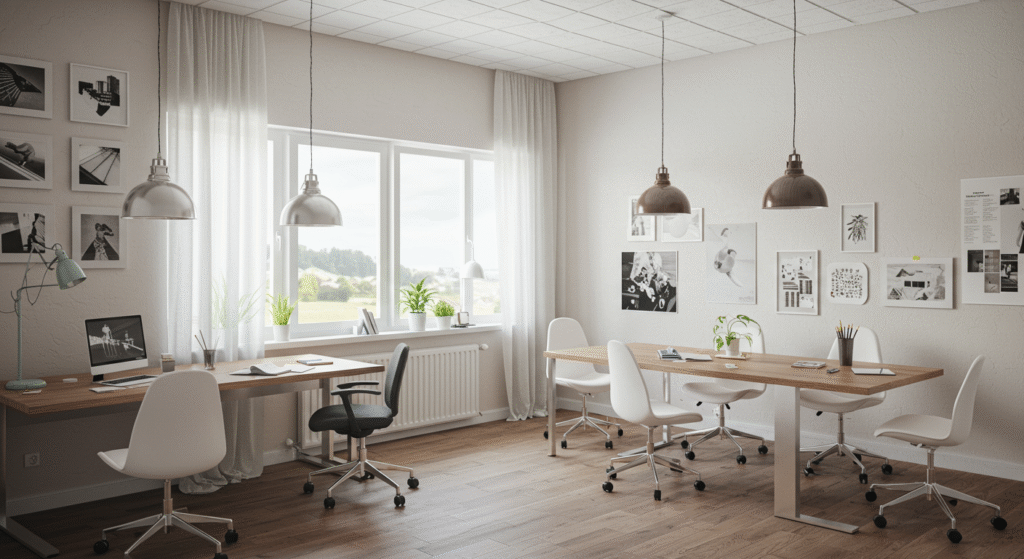Are you passionate about transforming spaces, harmonizing colors, and creating functional, beautiful environments? If so, a career in interior design might be your calling. The journey begins with finding the right educational foundation, and for many, that means actively searching for the best interior design courses near me. This comprehensive guide will help you navigate the diverse landscape of interior design education, from understanding different program types to identifying key factors for choosing the perfect fit that aligns with your creative aspirations and professional goals. Whether you’re a recent high school graduate or looking for a fulfilling career change, quality interior design programs are the gateway to making your vision a reality.
Why Choose a Career in Interior Design?
Interior design is more than just decorating; it’s a dynamic profession that blends art with science, creativity with technical skill. Interior designers play a crucial role in shaping the spaces where we live, work, and play, influencing mood, productivity, and overall well-being. The demand for skilled professionals who can create aesthetically pleasing, safe, and functional environments continues to grow across residential, commercial, and institutional sectors. Opting for professional interior design courses can equip you with the expertise needed to excel in this thriving industry.
- Creative Expression: Unleash your artistic vision and bring unique concepts to life, transforming mundane spaces into extraordinary ones.
- Problem-Solving: Address practical challenges like efficient space planning, accessibility compliance, and incorporating sustainable design practices.
- Diverse Opportunities: Work in a wide range of settings, including residential design, corporate offices, healthcare facilities, hospitality venues, retail spaces, or even establish your own independent design studio.
- Making an Impact: Design spaces that genuinely improve people’s lives and experiences, contributing to comfort, productivity, and happiness.
Embarking on this exciting career requires a solid educational background, which is why prospective students actively seek out reputable interior design programs that offer both theoretical knowledge and practical, hands-on skills. Finding the right training is the first step towards a rewarding professional life.
Types of Interior Design Programs Available
The educational pathway you choose will depend significantly on your prior experience, specific career goals, and the depth of knowledge you seek. Understanding the different types of interior design programs can help you make an informed decision.
ISMT Business School – BVOC in Interior Design
ISMT Business School provides only an Interior Design course under its BVOC (Bachelor of Vocation) program. This specialized program is designed to equip students with both creative and technical skills needed to excel in the interior design industry. The curriculum blends practical exposure, design theory, and industry-relevant projects to prepare students for real-world design challenges.
Specialized Workshops and Online Interior Design Courses
Beyond traditional degrees, numerous workshops and online courses cater to specific skills like advanced CAD software proficiency, LEED certification, or intricate color theory. These are excellent for continuing education, skill enhancement, or exploring specific interests before committing to a full program. Many practicing professionals utilize these to stay current with industry trends, adopt new technologies, and expand their service offerings.
What to Expect from Interior Design Courses Near Me
Regardless of the program type, quality interior design courses will provide a foundational understanding of core principles and practical application. When you enroll, you can expect to delve into a variety of subjects designed to build a holistic design skill set:
- Design Principles & Elements: Mastering concepts like line, form, space, light, color, texture, and pattern to create harmonious and engaging environments.
- Space Planning & Layout: Learning to optimize functionality, flow, and efficiency within any given area, from residential rooms to large commercial layouts.
- Color Theory & Application: Understanding the psychology of color, its impact on mood and perception, and how to create effective color palettes.
- Materials & Finishes: Gaining in-depth knowledge of various textiles, flooring options, wall coverings, furniture, and sustainable material choices.
- Lighting Design: Crafting ambiance and functionality through the strategic use of artificial and natural light sources.
- Drafting & Software: Developing both manual drafting skills and proficiency in industry-standard software such as CAD (Computer-Aided Design), 3D modeling (SketchUp, Revit), and rendering programs.
- History of Architecture & Furniture: Understanding design evolution, historical styles, and their relevance in contemporary design.
- Building Codes & Accessibility: Ensuring designs meet all safety, structural, and regulatory standards, including ADA (Americans with Disabilities Act) compliance.
- Business Practices: Learning essential skills in project management, effective client communication, budgeting, contract negotiation, and marketing your design services.
The Benefits of Local Interior Design Programs
While online options offer unparalleled flexibility, enrolling in interior design courses near me can provide unique and significant advantages for many aspiring designers:
- Hands-on Learning: Direct access to material libraries, physical workshops, and dedicated studio environments allows for practical, tactile learning experiences that are hard to replicate online.
- Robust Networking Opportunities: Building invaluable relationships with classmates, instructors, guest lecturers, and local design professionals through in-person events, critiques, and collaborations.
- Local Industry Exposure: Gaining insights into the specific market trends, local suppliers, trade showrooms, and client base within your immediate geographic region.
- Immediate Mentorship & Feedback: Direct, real-time feedback and personalized guidance from experienced faculty, fostering quicker skill development and problem-solving abilities.
- Access to Local Resources: Utilize local design showrooms, material suppliers, and even collaborate with local architects and contractors on student projects.
Career Planning & Educational Pathways
Choosing an educational path is a significant decision, whether you’re aiming for top-tier business leadership via programs like those at MBA colleges in Mumbai or specialized PGDM colleges in Mumbai, or dedicating yourself to a creative field like interior design. The key is finding an institution that aligns with your professional aspirations and offers robust support for your chosen career. Just as business professionals require specialized training, aspiring interior designers must seek out quality interior design schools that prepare them for a competitive industry. Researching a range of educational opportunities ensures you make an informed decision for your future, allowing you to build a career that truly resonates with your passions and goals.
Building Your Portfolio and Launching Your Career
A strong, professionally curated portfolio is your most valuable asset as an interior designer. Quality interior design courses near me will emphasize portfolio development throughout the curriculum, guiding you to select and present your best work. This includes well-documented studio projects, real-world internships, and any relevant freelance work. Upon graduation, a world of diverse career paths awaits:
- Residential Interior Designer (specializing in homes, apartments, renovations)
- Commercial Interior Designer (focusing on offices, retail, restaurants)
- Set Designer (for film, television, theatre)
- Exhibition Designer (creating engaging trade show booths and museum exhibits)
- Kitchen and Bath Designer (a highly specialized and in-demand niche)
- Space Planner (optimizing layouts for efficiency and aesthetics)
- Lighting Designer (specializing in illumination solutions)
- Furniture Designer (creating custom pieces)
- Sustainable Design Consultant (integrating eco-friendly practices)
- Interior Design Educator or Researcher
The interior design field offers immense potential for growth, self-employment, and continuous learning. Many successful designers eventually open their own firms, building a unique brand around their distinctive aesthetic and expanding their client base. Your education will provide the foundation, but your creativity and business acumen will define your trajectory.
Conclusion: Your Creative Journey Starts Here
The exciting journey to becoming a successful interior designer begins with selecting the right educational foundation. By thoroughly researching “interior design courses near me,” carefully considering crucial factors such as accreditation, curriculum, faculty expertise, and opportunities for practical experience, you can find a program that not only ignites your passion but also equips you with the comprehensive skills and knowledge needed to excel in this dynamic industry. Whether you opt for a local institution that offers hands-on studio experience or flexible online interior design courses, commit to a path that fosters creativity, technical proficiency, and continuous professional growth. Your dream of transforming spaces into functional, beautiful works of art is well within reach, and the perfect program is waiting to help you achieve it.
Frequently Asked Questions about Interior Design Courses
Q: What are the prerequisites for interior design courses?
Prerequisites vary significantly by program type and level. For certificate or associate’s degrees, a high school diploma or its equivalent is typically the primary requirement. Bachelor’s programs might require specific high school coursework, a minimum GPA, or even a basic portfolio submission. Master’s programs usually require a Bachelor’s Degree, often in a design-related field, though some programs accept degrees in other disciplines provided the applicant has a strong portfolio or completes foundational coursework.
Q: How long do interior design courses typically last?
The duration of interior design programs varies widely:
- Certificates/Diplomas: Generally range from 6 months to 2 years of full-time study.
- Associate’s Degrees: Typically take 2 years (approximately 60 credit hours) of full-time study.
- Bachelor’s Degrees: Most Bachelor of Arts or Science degrees take 3-4 years (90-120 credit hours) of full-time study.
- Master’s Degrees: Usually require 1-2 years of full-time study beyond a Bachelor’s Degree.
Part-time enrollment or online options can extend these durations considerably, offering greater flexibility.
Q: What is the career outlook for interior designers?
The career outlook for interior designers is generally positive and stable, with projected growth driven by new construction, renovations, and the increasing importance of creating functional, aesthetically pleasing, and sustainable environments. Demand is strong in both residential and commercial sectors. Specializing in areas like sustainable design, healthcare design, or aging-in-place design can further enhance career prospects and earning potential. Many graduates from reputable interior design courses find rewarding positions quickly.
Q: Can I study interior design online?
Absolutely, many accredited institutions offer comprehensive online interior design courses, ranging from introductory certificates to full bachelor’s and master’s degrees. Online programs provide significant flexibility, allowing you to study at your own pace from anywhere. However, it’s crucial to ensure that the chosen program offers strong practical components, robust portfolio development guidance, and access to necessary industry-standard software and digital resources to ensure a high-quality education.
Q: What’s the difference between an interior decorator and an interior designer?
While often confused, there’s a significant distinction. An interior decorator primarily focuses on the aesthetics of a space – selecting furniture, color palettes, textiles, accessories, and overall styling. They don’t typically handle structural changes. An interior designer, on the other hand, is a trained professional with formal education in architectural principles, building codes, space planning, and materials science. They can alter structural elements (with proper permits), plan complex layouts, and ensure designs meet safety and accessibility standards. Interior designers often hold specific degrees and may be licensed or certified, providing a broader range of services that impact safety, functionality, and the overall design integrity of a space.
Q: How much do interior design courses cost?
Costs for interior design courses near me or online vary widely based on the institution, program level, and location. Certificate programs can range from a few thousand dollars to $15,000+. Associate’s degrees might cost between $10,000 and $30,000. Bachelor’s degrees at private institutions can range from $40,000 to over $100,000 for the entire program, while public universities are typically more affordable, especially for in-state residents. Online programs can sometimes be more cost-effective. Always factor in additional expenses for materials, software licenses, and living costs.





